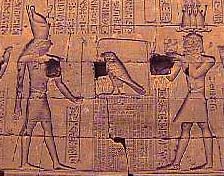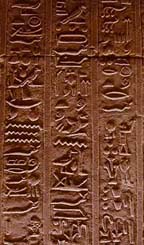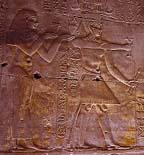|
 Edfu Kyphi Edfu Kyphi
The
Temple of Horus at Edfu was built between 237 BCE and 57 BCE on the location
of a legendary battle between Horus and Set, where temples have stood since 2660 BCE. It is the best preserved ancient temple
in Egypt. It was built by the Ptolemeic dynasty, which originated in Macedonia
and built temples for the native Egyptian priesthood as a way of currying their
favor. By this time, the priesthood was aware that the oral tradition and papyrus
records they had depended upon might not, in times of upheaval, be sufficient for preserving crucial
information about ritual, so they inscribed this information on the sandstone
of the Temple. The recipes at the Temple are thus the most detailed that have
come down to the present day. This recipe comes from the walls of the so-called
Laboratory Room located in the Temple's Great Hall. (The word kyphi is romanized from a Greek translation of the Ancient Egyptian word K'pt (kapet), which meant a mixture of aromatic herbs, resins, woods, wine, etc. that was heated or burned to be offered as perfume to the Gods.)
 Having
worked out the ancient recipe's proportions, we grind mastic, amber, sweet flag, aspalathos, camel grass, mint, and cinammon, adding them one at a time in a specific order.
This forms what is called the base, which is moistened with oasis wine and steeped overnight
in a copper bowl, as described in the Temple. Separately, the raisins are soaked
in oasis wine and then ground; they are mixed with the base and left to
steep for another five days. The excess wine is gently boiled off. Then the
frankincense and honey are mixed together, boiled to reduce their volume by
1/5, and quickly mixed with the base. The boiling removes water and causes the
honey to crystallize upon cooling. The material is left to rest overnight. Finally
the myrrh is ground and added, and the kyphi dried gently, which takes several
days. As you can see, this recipe not only calls for a number of ingredients
but is quite involved. We use all natural ingredients (all Alchemy Works products are entirely free from synthetics), which are mixed together in a high-fired ceramic bowl and a copper bowl with a wooden spatula to preserve their potency. This kyphi is thus completely different from the stuff commonly sold as such. It is not some dead agglomeration of sawdust and fragrance oils. It is the real deal, as close to the ancient reality as we moderns can get. Having
worked out the ancient recipe's proportions, we grind mastic, amber, sweet flag, aspalathos, camel grass, mint, and cinammon, adding them one at a time in a specific order.
This forms what is called the base, which is moistened with oasis wine and steeped overnight
in a copper bowl, as described in the Temple. Separately, the raisins are soaked
in oasis wine and then ground; they are mixed with the base and left to
steep for another five days. The excess wine is gently boiled off. Then the
frankincense and honey are mixed together, boiled to reduce their volume by
1/5, and quickly mixed with the base. The boiling removes water and causes the
honey to crystallize upon cooling. The material is left to rest overnight. Finally
the myrrh is ground and added, and the kyphi dried gently, which takes several
days. As you can see, this recipe not only calls for a number of ingredients
but is quite involved. We use all natural ingredients (all Alchemy Works products are entirely free from synthetics), which are mixed together in a high-fired ceramic bowl and a copper bowl with a wooden spatula to preserve their potency. This kyphi is thus completely different from the stuff commonly sold as such. It is not some dead agglomeration of sawdust and fragrance oils. It is the real deal, as close to the ancient reality as we moderns can get.
 The scent
of this kyphi is sweet, with a honey undertone throughout.
The smell is extremely pleasant and makes you want to take big breaths of it. The frankincense
quickly rises to the fore, which distinguishes this from the other two kyphi
versions we offer, and then the lemon-drop scent of the camel grass announces
itself. The Edfu kyphi
is much smokier than the other kyphis because the honey is boiled instead of
just being added. The smoke makes it especially good for consecrating objects
or a room. The smell is somehow narcotic and brings to mind forgotten days of
the past, creating a comforting space—perhaps this is the frankincense working.
Especially notable about this kyphi is the importance of sound. You can
hear it cooking or simmering as it volatilizes. Breathing it in, one becomes
aware of one's breath. The sleepiness that all the versions of kyphi cause is
here joined by hearing voices talking quietly instead of seeing visions.
As the frankincense recedes and the myrrh takes over, you can feel the shift
from day to night that is associated with kyphi. This would make this kyphi especially good for works focusing on transition,
especially gradual ones. The myrrh here gives one the sensation of being comfortably
walled in. The cinnamon at the close is purifying, and one awakens refreshed.
This kyphi makes a wonderful contrast to Galen's
and Dioscorides' kyphi. To our minds,
this is the most sound-centered of the three and the one that best focuses
on the transition from day to night. Our founder was very proud of the way this kyphi has
come out and we are pleased to continue crafting it accordingly. Please note that, like any synthetic-free loose incense, it requires charcoal to burn, since it is composed of pure ingredients and contains no fillers. The scent
of this kyphi is sweet, with a honey undertone throughout.
The smell is extremely pleasant and makes you want to take big breaths of it. The frankincense
quickly rises to the fore, which distinguishes this from the other two kyphi
versions we offer, and then the lemon-drop scent of the camel grass announces
itself. The Edfu kyphi
is much smokier than the other kyphis because the honey is boiled instead of
just being added. The smoke makes it especially good for consecrating objects
or a room. The smell is somehow narcotic and brings to mind forgotten days of
the past, creating a comforting space—perhaps this is the frankincense working.
Especially notable about this kyphi is the importance of sound. You can
hear it cooking or simmering as it volatilizes. Breathing it in, one becomes
aware of one's breath. The sleepiness that all the versions of kyphi cause is
here joined by hearing voices talking quietly instead of seeing visions.
As the frankincense recedes and the myrrh takes over, you can feel the shift
from day to night that is associated with kyphi. This would make this kyphi especially good for works focusing on transition,
especially gradual ones. The myrrh here gives one the sensation of being comfortably
walled in. The cinnamon at the close is purifying, and one awakens refreshed.
This kyphi makes a wonderful contrast to Galen's
and Dioscorides' kyphi. To our minds,
this is the most sound-centered of the three and the one that best focuses
on the transition from day to night. Our founder was very proud of the way this kyphi has
come out and we are pleased to continue crafting it accordingly. Please note that, like any synthetic-free loose incense, it requires charcoal to burn, since it is composed of pure ingredients and contains no fillers.
|
Edfu
Kyphi
1 oz. in tin $21.00
Other kyphi incenses: Galen's Kyphi, Dioscorides'
Kyphi
Uses in Witchcraft
& Magic:
Honoring Horus
Trancework
Divination
Consecration
Purification
© 2004-2024 Alchemy Works;
No reproduction without permission
|